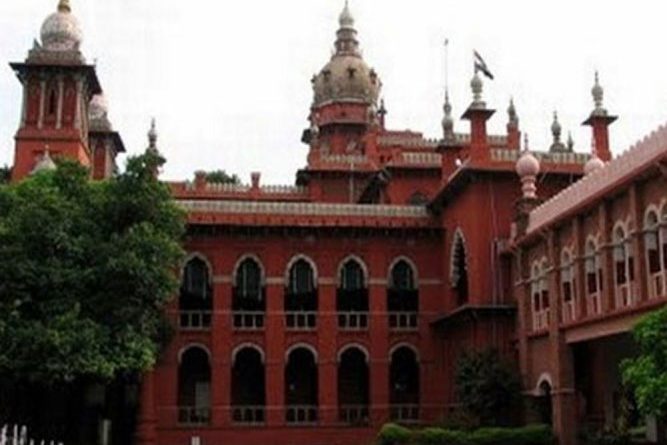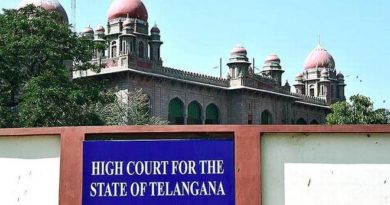Central Government is Duty Bound to Follow the Provisions of The Official Languages Act. Hindi Cannot Be Used for Official Correspondence with Tamil Nadu: Madras High Court
(Judicial Quest News Network)
The Madras High Court has emphasised in a recently delivered judgement that the Central Government is duty bound to communicate in English with those states that have not adopted Hindi as their official language.
According the verdict the official Language Act 1963 and the official Language Rule 1976, the Bench of Justices N Kirubakaran (now retired) M.Duraiswamy observed.
Once a representation is given in English, it is the duty of the Union Government to give a reply in English only which will also be in consonance with the statute, viz., the Official Languages Act. The Court said.
Taking into consideration the above facts and the provisions of the
Official Languages Act 1963 and the Official Languages Rules 1976, this Court directs that the Union Government, other officers and instrumentalities shall follow the provisions of official languages Act 1963, especially, Section 3 of the Act and the Official Languages (Use for Official Purpose of the Union) Rules, 1976.
The bench has further contended that different ethnic, linguistic, and cultural identities have to be protected and any attempt to destroy and disrupt tha same may become sensitive issues.
Any kind of fanaticism is not good for any society. Fanaticism, in any form, is to be condemned, if it is exhibited. Linguistic fanaticism is more dangerous as it would give an impression that one language alone is superior and being imposed upon the people speaking different languages. When even an apprehension should not be created that a particular language is surpassed or side-lined in a multi-linguistic country like ours, a few chosen languages are getting princely status with enormous money allotted for development of those languages alone. The Court added.
The court has further added that as evident from the reports of Kodumanal excavation site in Erode District, Tamil language had developed even before 400 BC, which is scientifically proved by doing Carbon Dating Test on the pottery sets found with Tamil inscriptions. Keeladi excavation reports proved that Tamil language was used during 500 BC. The above facts should not be mistaken and misunderstood that Tamil was used only during 500 BC. Even before 500 BC, the said language was used by the masses. Therefore, Tamil should have been the language of masses, at least, around 3000 to 4000 BC. It is not to promote the literary value of Tamil language, but it is only to see that the ancient language is protected if it is continued to be used by the masses and used by the Government.
When such is the importance given to the languages of the country, it seems that a few officials in the Respondent Government either without understanding the sensitivity of the issue or by inadvertence, are bent upon using Hindi in communications and other official matters, which make the people to think that the said language is being thrust upon them contrary to the provisions of the Official Languages Act, 1963 as
amended by the Official Languages (Amendment) Act, 1967.
The court has also referred to the section 8 of the Official languages Act, 1963. Which excluded the application of the Official Languages Rules,1967 in the State of Tamil Nad.Therby making it clear the Central Government is expected to use English for official communications with Tamil Nadu.
A counter affidavit has been filed by the Respondents admitting the
provisions of the Official Languages Act, 1963 and the necessity to use English language in the communication between the Union and the States, which has not adopted Hindi as their official language. However, in Paragraph 6, it has been stated that inadvertently, in the instant case, reply was submitted in Hindi, and immediately, English version of the same was communicated to the Member of Parliament. Further, there is
no intention to violate the provisions contained in the Official Languages Act, 1963 and the Official Languages (Use for Official Purpose of the Union) Rules, 1976.
This Court hopes that the Central Government would seriously consider to amend Article 350, so that, not only representation is given in the languages of the Union or the States, but also reply is given in the same language used by the citizens.
The Government of Tamil Nadu passed the Official Languages Act, by which, only two language formula is being adopted viz., Tamil and English. Therefore, the Central Government is also expected to respect the sentiments of the people. It would be appropriate and it is expected that the Central Government gives its reply to the citizens, in their respective language as stated in Article 350.
The Lok Sabha MP S Venkatesan from Madurai had filed a PIL petition
After he received a reply from the Central government in Hindi to a representation made by him in English.
The MP claimed that he did not receive any response from to his additional communication, he moved the Court. His petition had urged the Court to direct the use of English in all communications between the Central government and the State of Tamil Nadu.
The Central government had admitted that there was a mandate to use English in communication between the Central and States that have not adopted Hindi as their official language.
ASG L. Victoria Gowri appearing for the Centre submitted that the reply to Venkatesan had been inadvertently written in Hindi. There was no intention on the part of Central Government to violate any provision of the Official Languages Act,1963 or Rules, the Court was told.
The Central Government understood the importance of all the languages
of the country and formulated a National Educational Policy, which gives much thrust and importance to mother tongue in education. As per the said educational policy, the elementary education should be in mother tongue upto V Standard. The Government’s policy should be welcomed as it is in the interest of all the languages. When such is the importance given to the languages of the country, it seems that a few officials in the Respondent Government either without understanding the sensitivity of the issue or by inadvertence, are bent upon using Hindi in communications and other official matters, which make the people to think that the said language is being thrust upon them contrary to the provisions of the Official Languages Act, 1963 as amended by the Official Languages (Amendment) Act, 1967.The Court Said.
The court was not convinced that it was a bona fide error on the Centre’s part. The bench opined that if the mistake had really been inadvertent, the Central government would have immediately replied to Venkatesan in English after the issue was raised.
There are several other instances where the Centre had preferred to respond in Hindi Language to the communications forwarded by Tamil nadu Government.
All the communications must be in such a language where both the parties should have convincing atmosphere to understand each other communications, mandatorily it should be vernacular communication.
The Court has cautioned the Union government and its officers and instrumentality to follow the provisions of Official Languages Act 1963 and the Official Languages Rule 1976.
[Read Judgement]




